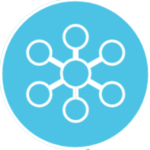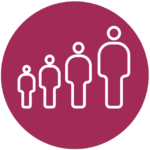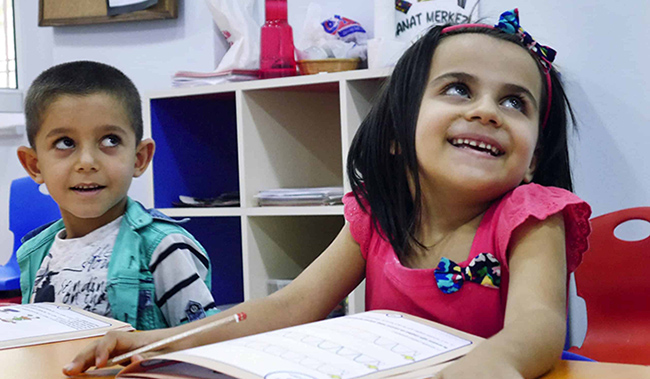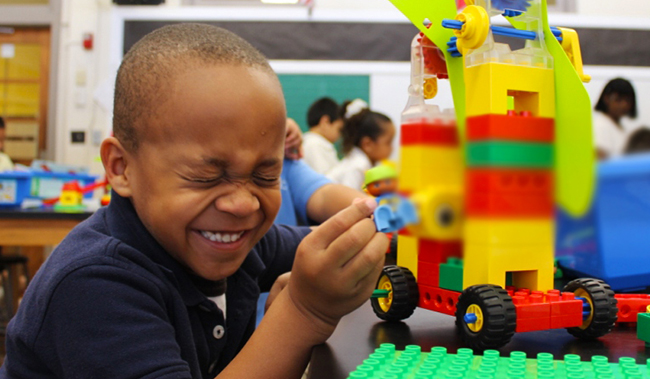Supporting mental health by improving care access and engaging community connections
The COVID-19 Pandemic and resulting lock-down restrictions and economic recession negatively affected mental health outcomes for many, and created new barriers for those already living with mental illness. In 2019, 1 in 10 U.S. adults experienced anxiety and depressive disorder. In 2020, that number rose to 4 in 10 American adults[i]. Black and Latinx/Hispanic communities have been more likely than their white counterparts to report symptoms of anxiety or depressive disorder during the pandemic [i], while concurrently experiencing disproportionately high rates of COVID deaths, cases, and related financial impacts[iii].
This rise in symptoms of anxiety and depression has led to public collaboration and awareness. While donors in the past have concentrated on funding direct services and research and innovation, emerging donors are more interested in identifying funding opportunities that are more focused on capacity building, systems change philanthropic plays. (Visit Health in Mind for more strategies on supporting mental health and addiction.)
Here’s how you can help.
What Donors Can Do
Donors can support mental health and well-being by funding efforts that engage community caregivers to expand mental health care, rebuild connections among people and communities, make mental health care affordable and accessible for all, and reinvent the mental health crisis system.
Below you’ll find a description of each strategy, profiles of nonprofits employing these strategies and additional nonprofits to consider.

Learn more: Expand access to the full range of what works, a Health in Mind strategy
Engage Community Caregivers to Expand Mental Health Care Availability
The supply of traditionally trained professionals is not enought to meet the increasing demand for mental healthcare [i]. Community organizations can relieve pressure on the short-staffed mental health professional workforce by training lay people to provide basic mental health and wellness care, practice, or assessments. Effective community organizations hire mental health workers and lay staff with shared lived experiences, languages, and cultural backgrounds with the clients and continually train and retain them. They also have systems for managing serious mental health crises with referrals to mental health professionals and organizations. By supporting community-centric models, donors can increase mental health resources, expand outreach, and create progress towards mental health and wellness.

Learn more: Focus on young people and Help the most affect populations, Health in Mind strategies
Rebuild Connections Among People and Communities
COVID restrictions and social distancing created isolation and frayed social ties throughout society, from young children and teens who missed socialization experiences to remote-working adults and isolated seniors. Throughout the pandemic studies have consistently shown that young people are most vulnerable to increase psychological distress[iv]. One solution to address rising levels of loneliness, stress, and anxiety across the young and adult populations[xi] is to encourage resocialization by fostering positive and safe spaces (virtually and in-person) where groups of people who share common life experiences can come together and build community, growth, and positive mental health practices.

Learn more: Transform the landscape, a Health in Mind strategy
Make Mental Health Care Affordable and Accessible for All
Cost is a major barrier to mental health care. COVID-19 further decreased access when as many as 12 million individuals lost their health insurance during the pandemic[i]. The 2008 passage of the Mental Health Parity and Addiction Equity Act (MHPAEA) calls for insurance coverage for mental health conditions, including substance abuse disorder (SUD) treatment to be equal to coverage of any other medical condition [iii], but non-compliant insurance practice have held back proper implementation (Mental Health Parity Research, Psychiatric Times). Achieving mental health parity involves policy change and enforcement and expanding the breadth and reach of already existing services. We focus on organizations that expand affordability and access to mental health services.

Learn more: Transform the landscape and Support those with the most serious disorders, Health in Mind strategies
Reinvent the Mental Health Crisis System
A robust, equitable, 24-hour phone number for mental health emergencies analogous to 911 would change response to mental health crises. At the onset of the pandemic the National Alliance on Mental Health Illness (NAMI) saw its mental health hotline call volume increase by 300% More specialized helplines, such as the text banks that supports LGBTQ youth, saw a similar spike in volume[i]. On a global scale, Emergency Medical Service calls increased exponentially.[ii] Suicides are the 10th leading cause of death in the U.S.[iii] While three states have passed legislation to facilitate 988 mental health crisis/suicide prevention lifelines, a new national 988 number would divert calls going to 911 and send those in crisis directly to systems that ensure adequate, safe response [iv]. Quality crisis response involves a cascade of followup actions and services, including walk-in clinics, mobile teams, and long-term care solutions (e.g., respite care, residential treatment care).
Opportunities for Impact
Nonprofits Making an Impact
To help donors see what an effective program can look like, we highlight two nonprofit organizations that are working towards granting greater access to mental health care.
Organizations to Support
Here we share a range of organizations in the U.S. and internationally that are applying successful mental health delivery and advocacy strategies. We sourced these organizations from recent applied research on Supporting Mental Health during COVID, past guidance, and partnerships with Mindful Philanthropy, Greenlight Fund , Lipman Family Prize.
Engage community caregivers to expand mental health care
The Confess Project is a national mental health advocacy non-profit that utilizes Black barbers to equip marginalized men of color with the mental health strategies and coping skills to overcome anxiety and depression that are enhanced by systematic racism.
CBM is an international nonprofit, that works in partnership with communities, health authorities, and people with lived mental health experience to support those with mental health disorders and disabilities in developing countries. CBM improves access to mental health treatment by training community workers to identify mental health conditions and facilitate peer support groups.
Inner Explorer is an online mindfulness platform designed to support mental health and well-being through Mindfulness-Based Social Emotional Learning (MBSEL). While not specifically training community mental health workers, this program relieves pressure on the professional work force by empowering lay people with the tools they need to cultivate critical social emotional skills, such as self-awareness, self-regulation, empathy, and resilience.
Rebuild connections among people and communities
First Place for Youth has three different programs that provide direct and wraparound services spanning from training, housing, and education for youth aging out or exiting the foster care system. The Independent Skills Living Program (ISLP) offices provide a combination of “drop in” hours, social activities, and skill-building workshops that help develop practical skills and confidence.
Fountain House is a national mental health nonprofit fighting to improve health, opportunity, and end social and economic isolation for people living with serious mental illness (SMI) through Clubhouses (both digital and in-person) that encourage social connection amongst individuals with SMI and reflect an insistence of belonging and acceptance.
OATS from AARP helps older adults, regardless of their circumstances, learn to use and leverage technology to improve physical and mental health, financial stability and stay connected. Through its flagship program, Senior Planet, OATS brings together older adults with innovative learning experiences in-person and online with topics ranging from digital essentials to yoga.
Pace Center for Girls features a balanced emphasis on academic and social services for middle and high school aged girls and young women. With nonresidential centers (which operated 100% virtually during the pandemic), open during normal school hours across the state of Florida, Pace encourages a positive and safe learning environment for girls. The program has garnered national recognition as one of the most effective programs in the country for keeping girls from entering the juvenile justice system.
Trevor Project is the world’s largest suicide prevention and crisis intervention organization for LGBTQ young people. While they are saving the lives of queer youth through their various suicide prevention programs, including a 24/7 phone lifeline, they also are home to the world’s largest safe space social networking site called (TrevorSpace) for LGBTQ youth ages 13-24 and their families.
Youth Era is a nonprofit based in Oregon that provides a variety of programs targeting accessibility to supportive services for youth. These include: Drop-in Centers, Virtual Peer Support (e.g., Instagram, Twitch, Discord), Technical Assistance Training, Crisis Response and virtual trainings (called PeerPlus and UpLift ) that have allowed their work to continue thriving during the pandemic.
Make mental health care affordable and accessible for all
The Loveland Foundation is addressing the barriers affecting access to treatment by members of diverse ethnic and racial groups with the Loveland Therapy Fund which provides financial assistance to Black women and girls seeking therapy nationally.
Project Echo employs the ECHO model, a low-cost system of tele-mentoring, to share support, guidance, feedback and best practices to mental health/general health practitioners in underserved communities virtually.
Faces and Voices of Recovery is a national nonprofit dedicated to changing the way addiction and recovery are understood and embraced through advocacy, education and leadership. Priorities for advocacy in 2022 include legislation to set aside 20% of all behavioral health funding for BIPOC recovery services and securing funding for equal to in-person reimbursement for telehealth services.
Reinvent the mental health crisis system
Crisis Now is an advocacy network led by the National Association of State Mental Health Program Directors (NASMHPD) that fiercely advocates for not only a national suicide prevention hotline but also, a crisis response system that diverts people in mental health distress from the emergency department and jail by developing a continuum of crisis care that match people’s clinical needs.
Youth Era is a nonprofit based in Oregon that provides a variety of programs targeting accessibility to supportive services for youth. These include: Drop-in Centers, Virtual Peer Support (e.g., Instagram, Twitch, Discord), Technical Assistance Training, Crisis Response and virtual trainings (called “PeerPlus”& ”UpLift” ) that have allowed their work to continue thriving during the pandemic.
The Trevor Project is the world’s largest suicide prevention and crisis intervention organization for LGBTQ young people. They are saving the lives of queer youth by providing support through free and confidential suicide prevention programs such as their 24/7 phone lifeline (Trevor Lifeline), text line (TrevorText) and online chat (TrevorChat). Youth are connected with trained Trevor counselors who offer support and crisis intervention.
Notes
[i] https://www.kff.org/coronavirus-covid-19/issue-brief/the-implications-of-covid-19-for-mental-health-and-substance-use/
[ii] Ettman, C. K., Abdalla, S. M., Cohen, G. H., Sampson, L., Vivier, P. M., & Galea, S. (2020). Prevalence of depression symptoms in US adults before and during the COVID-19 pandemic. JAMA Network Open, 3(9). https://doi.org/10.1001/jamanetworkopen.2020.19686
[iii] https://www.kff.org/racial-equity-and-health-policy/issue-brief/covid-19-cases-and-deaths-by-race-ethnicity-current-data-and-changes-over-time/
[iv] https://theundefeated.com/features/new-poll-shows-how-the-pandemic-has-devastated-black-families/
[i] Rebecca Renner, “COVID-19 is taking a heavy toll in America’s mental health-care deserts,” National Geographic, 30 December 2020, https://www.nationalgeographic.com/science/article/coronavirus-is-taking-heavy-toll-america-mental-health-care-deserts
[ii]Wan, W. (2020, December 22). Pandemic relief bill delivers $4.25 billion for Mental Health Services. The Washington Post. Retrieved October 22, 2021, from https://www.washingtonpost.com/health/2020/12/21/mental-health-services-get-billions-relief-bill/.
[i] Kichloo, A., Albosta, M., Dettloff, K., Wani, F., El-Amir, Z., Singh, J., Aljadah, M., Chakinala, R. C., Kanugula, A. K., Solanki, S., & Chugh, S. (2020, August). Telemedicine, the current COVID-19 pandemic and the future: A narrative review and perspectives moving forward in the USA. Family medicine and community health. Retrieved November 18, 2021, from https://www.ncbi.nlm.nih.gov/pmc/articles/PMC7437610/.
[ii] Ojha, R., & Syed, S. (2020, September). Challenges faced by mental health providers and patients during the coronavirus 2019 pandemic due to technological barriers. Internet interventions. Retrieved November 18, 2021, from https://www.ncbi.nlm.nih.gov/pmc/articles/PMC7267786/.
[iii] Jolicoeur, L., & Mullins, L. (2021, June 23). Zoom therapy and not enough beds: How the pandemic affected kids’ access to Mental Health Care. Zoom Therapy And Not Enough Beds: How The Pandemic Affected Kids’ Access To Mental Health Care | WBUR News. Retrieved November 18, 2021, from https://www.wbur.org/news/2021/06/23/pandemic-kids-access-mental-health-care.
[iv] Alison Abbott, “COVID’s mental-health toll: how scientists are tracking a surge in depression,” Nature, 03 February 2021, https://www.nature.com/articles/d41586-021-00175-z
[v] Lynn Jolicoeur and Lisa Mullins, “Zoom Therapy and Not Enough Beds: How The Pandemic Affected Kids’ Access To Mental Health Care,” Wbur, https://www.wbur.org/commonhealth/2021/06/23/pandemic-kids-access-mental-health-care
[vi] https://mhanational.org/issues/state-mental-health-america
[vii] https://mcc.gse.harvard.edu/reports/loneliness-in-america
[viii] https://mcc.gse.harvard.edu/reports/loneliness-in-america
[ix] https://www.apa.org/news/press/releases/stress/2021/sia-pandemic-report.pdf
[x] https://healthblog.uofmhealth.org/childrens-health/national-poll-pandemic-negatively-impacted-teens-mental-health
[xi] https://www.apa.org/news/press/releases/stress/2021/sia-pandemic-report.pdf
[xii] https://jamanetwork.com/journals/jama/fullarticle/2763596
[i] Rebecca Renner, “COVID-19 is taking a heavy toll in America’s mental health-care deserts,” National Geographic, 30 December 2020, https://www.nationalgeographic.com/science/article/coronavirus-is-taking-heavy-toll-america-mental-health-care-deserts
[ii] Empower deck, https://docs.google.com/presentation/d/e/2PACX-1vQm596PXtNhLGfu5f2Fk9Vcx9WesYwFPReJHm5tkFqlr0iE9BQ22ezLK45xSD3sODzp0xb-xtYuWY-Z/pub?start=false&loop=false&delayms=10000&slide=id.g57f18858fa_0_163
[iii] https://www.psychiatrictimes.com/view/mental-health-parity-in-the-us-have-we-made-any-real-progress
[i] Rebecca Renner, “COVID-19 is taking a heavy toll in America’s mental health-care deserts,” National Geographic, 30 December 2020, https://www.nationalgeographic.com/science/article/coronavirus-is-taking-heavy-toll-america-mental-health-care-deserts
[ii] Al Amiry, A., & Maguire, B. J. (2021, September 7). Emergency medical services (EMS) calls during COVID-19: Early lessons learned for systems planning (a narrative review). Open access emergency medicine : OAEM. Retrieved November 18, 2021, from https://www.ncbi.nlm.nih.gov/pmc/articles/PMC8434918/.
[iii] “Countdown to 988 Implementation: An Overview of 988 to Guide Urgent Philanthropic Action,” Mindful Philanthropy, https://virtuous-email.s3.amazonaws.com/Email/org_1872/Countdown%20to%20988%20Implementation_%20An%20Overview%20of%20988%20to%20Guide%20Urgent%20Philanthropic%20Action.pdf
[iv] Anita Everett, “Groundbreaking Developments in Suicide Prevention and Mental Health Crisis Service Provision,” Substance Abuse and Mental Health Services Administration, 14 May 2021, https://blog.samhsa.gov/2021/05/14/groundbreaking-developments-suicide-prevention
[v] https://www.nami.org/NAMI/media/NAMI-Media/Images/FactSheets/Crisis-Service-FS.pdf
[vi] https://www.azcentral.com/story/news/local/arizona-health/2020/02/21/other-states-copy-arizona-model-behavioral-health-crisis-care/4794168002/
[vii] https://www.nami.org/NAMI/media/NAMI-Media/Images/FactSheets/Crisis-Service-FS.pdf


